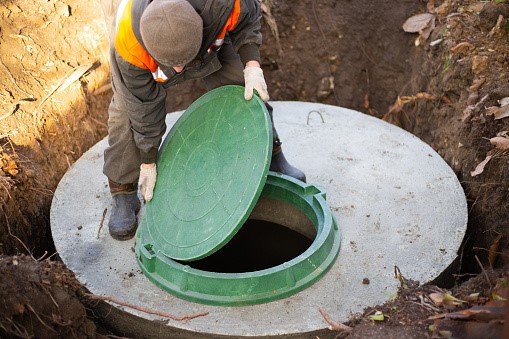When a septic system fails, it can no longer effectively treat and dispose of wastewater, posing health and environmental risks. To better understand and prevent septic system failure, it’s essential to recognize the signs of a failing septic system and the common reasons behind it.
What Happens When a Septic System Fails?
Septic systems treat and dispose of wastewater generated by households not connected to a traditional sewer system. When functioning correctly, the system separates solid and liquid waste, breaking down the solids and allowing the liquid to filter through the soil. However, a failing septic system can’t perform these functions effectively, leading to issues like contaminated groundwater, unpleasant odors, and sewage backups.
What are the Signs of a Failing Septic System?
If you notice any of these telltale signs, your septic system could be failing and needs immediate attention:
- Slow-draining sinks and toilets: Among the first signs to look for are drains that empty slowly. This may indicate that the septic tank is full or a blockage has formed in the pipes leading to the tank.
- Sewage backups: Wastewater flowing up from your drains poses a serious health risk. This sign of septic system failure calls for emergency services from a septic system professional.
- Wet spots and foul odors in your yard: A failing septic system may cause water to pool in the drain field. This could mean the tank is overflowing or the drain field is malfunctioning. Foul odors typically accompany this problem because the wet spots contain raw sewage.
- Lush, green grass: While a lush lawn may seem like a benefit, if the grass over your drain field is significantly greener than the rest of your yard, it may signal a failing septic system. Excess untreated wastewater contains nutrients that fertilize your grass, but it’s unsafe to dispose of it this way.
- High nitrate and bacteria levels in well water: If you have a septic system, chances are your water comes from a private well. Regular testing is essential to protect your family’s health. Watch out for increased levels of nitrates and bacteria, which could indicate that untreated wastewater from a failing septic system is contaminating your well water.
What are Some Common Reasons a Septic System Doesn’t Work Properly?
Several factors can cause a septic system to fail, including:
- Improper installation: A septic system is set up for success or failure on installation day. Hire a qualified professional to install or replace your septic system to ensure reliable, long-term performance.
- Poor maintenance: Failing to pump your septic tank regularly can cause sludge and scum to accumulate, leading to blockages and system failure.
- Overloading the system: Sending excessive amounts of water into the septic system can overwhelm it and cause it to fail.
- Flushing non-biodegradable items: Septic systems are only prepared to handle human waste and septic-safe toilet paper. Flushing anything non-biodegradable, like paper towels, baby wipes, or feminine hygiene products, can clog the septic system.
- Using too many cleaning products: Chemicals and antibacterial soaps are problematic because they kill the bacteria in the tank responsible for breaking down waste. This can lead to the worst-case scenario of a completely clogged drain field.
- Tree root intrusion: Tree roots can infiltrate your septic system, causing pipe blockages and drain field damage.
- Soil compression in the drain field: A septic system can fail because of broken, crushed, or clogged pipes in the drain field. Heavy vehicle traffic is the most common cause.
How Can You Prevent Septic System Failure?
Now that you know what causes a septic system to fail, you can take steps to avoid them. Here’s how:
- Schedule routine maintenance: Septic tank pumping and inspections allow professionals to identify and address small issues before they become more severe.
- Limit water usage: Install water-efficient appliances and fixtures, repair plumbing leaks, and spread laundry/dishwasher loads throughout the week.
- Be mindful of what goes down the drain: Avoid flushing anything besides human waste and toilet paper, and minimize harsh chemicals that disrupt your septic tank’s bacterial balance.
- Protect the drain field: Avoid driving or parking vehicles on the drain field. Also, direct gutters and downspouts away from the drain field to prevent excess saturation.
- Monitor tree roots: Regularly inspect your septic system for tree root intrusion. Consider removing any trees with invasive roots that are too close to your septic tank.
Reliable Septic System Services in San Francisco
If you need septic services in the San Francisco Bay Area, turn to Trinity Liquid Waste. Our years of experience, prompt service, and commitment to customer satisfaction set us apart from other septic service providers. We perform preventative septic pumping and inspections, as well as septic repairs and 24-hour emergency service. Contact us today at 510-874-6489 to schedule routine maintenance or address any concerns with your septic system.

